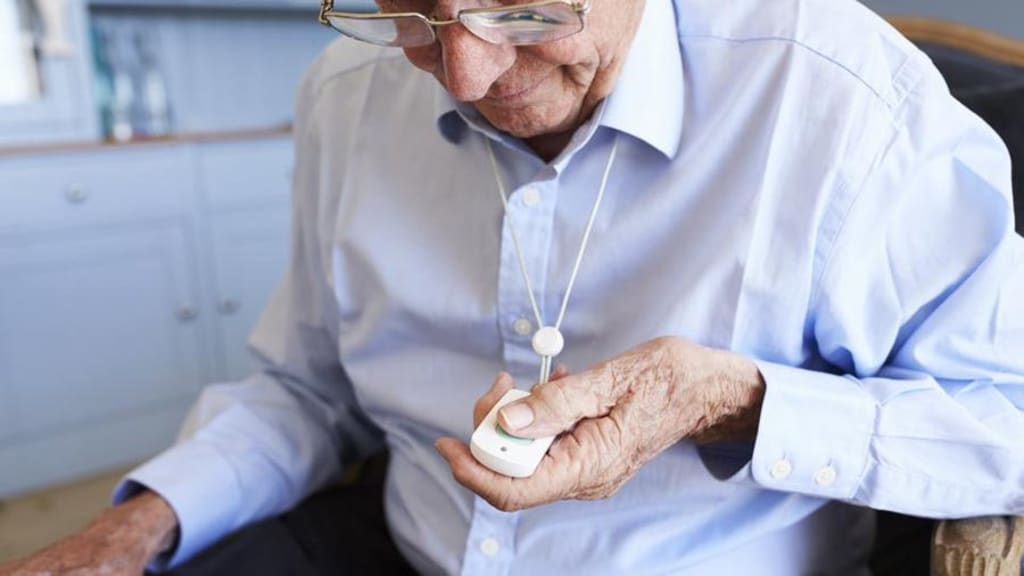
Founded in 1987, Life Alert was the first company to offer an emergency response pendant system which, at the push of a button, connects users to a 24-hour personal emergency monitoring center. Life Alert’s medical emergency monitoring system can provide peace of mind for older adults or vulnerable people who wish to continue living independently.
What Is Life Alert?
Life Alert is a personal emergency response and home medical alert system company that provides home audio monitoring protection. At the touch of a help button on an emergency pendant, wristband or unit positioned in the shower or on the bathroom wall, Life Alert users contact Life Alert’s onsite personal emergency monitoring center. Depending on your situation, Life Alert will contact the police, the paramedics, the fire department, your doctor or designated friends and family. On its website, Life Alert claims to handle more than two million personal emergency calls a year—and save an average of at least one life from a potential catastrophic outcome every 11 minutes.
Two-Way Communication in a Crisis:
A medical alert system provides around-the-clock monitoring and swift access to emergency services. At the push of a button on a pendant or a home base unit, you can connect to a 24-hour personal emergency monitoring service, which fields your calls from your home or while on the go.
A home base unit, which may or may not require cellular service or a landline depending on the medical alert company you choose, will direct your call to the company’s emergency monitoring service dispatcher, who will then assess your situation and contact 911 or local emergency responders or family members for you.
If you can’t speak in an emergency, medical alert system dispatchers will assume you’re in distress and send help to your address listed in their computer system.
Life Alert trains and operates its own emergency response dispatchers rather than contracting with an outside agency. If you need emergency help, Life Alert circumvents the 911 system by summoning paramedics and your doctor directly.
Automatic Fall Detection:
Emergency medical alert systems may include fall detection technology through a pendant or wristband, which automatically sends an alarm to the company’s emergency response center if the technology detects a fall. The neck pendant fall button may or may not have a speaker to talk with an emergency responder for two-way communication. The pendant may offer fall detection technology and summon emergency help even if you’re unable to push the button. Emergency medical alert systems with fall detection will include a disclaimer stating that fall detection does not detect 100% of falls.
Life Alert products do not offer fall detection technology.
Ease of Installation:
Installing an emergency medical alert system may be a do-it-yourself task, starting with components that arrive in the mail with instructions, which may be as easy as plugging the base unit into an outlet and then testing it by pushing the emergency button.
Other components, such a mobile alert device with a lanyard, may also be part of the system. There’s plenty to read when an emergency medical alert system arrives in the mail. Watching installation videos on the company’s website or calling the company for assistance can be helpful for installation and understanding how the components work together, as well as the system’s potential limitations.
At Life Alert, professional installation is available nationwide. Field technicians can come to your home to install Life Alert equipment for you, if necessary.
Alternatives to Life Alert
As a pioneer in the medical alert industry, Life Alert has a long track record of providing personal emergency medical assistance. “We’re not the cheapest, but we’re the best,” said a spokesperson for the company. Life Alert costs $69 to $89 per month, depending on the medical alert system you choose, and the company requires a 36-month membership. You can’t buy a system directly from Life Alert’s website. You’re required to call for a brochure with more information about products and pricing.
Competitors offer a more streamlined purchasing process, flexible payment models and other features. Here’s a rundown of three top contenders.
1.MobileHelp
MobileHelp offers a range of products for the home and on the go use, including the MobileHelp Complete Protection System (DUO) Medical Alert system. This product features a cellular base station for your home, a mobile alert device with a lanyard to wear when you’re out, a charging station for the mobile device and a neck pendant or wrist pendant/fall button. This button can detect a fall and alert the emergency response center, even if you can’t push the help button.
Prices range from $19.95 to $54.95 per month, with discounts available for annual payment. A long-term contract isn’t required. MobileHelp’s website offers complete product and pricing information, without requiring you to call for more information.
The MobileHelp system doesn’t require a landline or a wireless service contract to operate. Just plug it into an outlet, and follow the setup process. MobileHelp’s service is only usable/available in areas of the U.S. with AT&T cellular service, which may make it inaccessible if you live in rural areas where AT&T cellular service is spotty or nonexistent.
MobileHelp offers patented fall and impact detection on its wearable help button pendant or wristband. Its fall detection technology offers patented motion sensor and impact sensor technology, with a built-in delay of 20 seconds, which helps eliminate false alarms. If movement doesn’t occur for 20 seconds of a detected fall, MobileHelp will contact emergency services for you.
2.One Call Alert
One Call Alert is marketed through pharmacies and doctor’s offices. MobileHelp recently acquired the company to increase market share.
Although One Call Alert and MobileHelp have different websites, they are the same company, with the same products and pricing and the same fall detection and impact sensor technology in their wearable help button.
3.Get Safe
The Get Safe medical alert system is home-based, with emergency call button products available for homes of all sizes, based on the number of bedrooms. Upfront equipment costs vary from $79 (zero to one bedroom) to $279 (four to bedrooms), but the monthly cost is $24.95 per month no matter which system you choose.
All Get Safe systems include AT&T 4G LTE cellular coverage to operate; a landline isn’t required. To activate the system, users must say “Call 9-1-1” twice near a Get Safe call button that you place throughout your home.
Referring to its products as “medical alert systems you don’t have to wear,” Get Safe does not offer an on-the-go mobile lanyard or wristband option. Fall and impact sensor detection is not available.
How to Select the Right Medical Alert Device for Yourself or a Loved One?
“The first question to ask yourself before buying a medical alert system is what event you are trying to prevent?” says Kosta Yepifantsev, CEO of Home Caregivers, a long-term care company based in Cookeville, Tennessee.
Focus on the features you need based on you or your loved one’s medical condition or situation. For example, “an alert system that doubles as a GPS tracker is extremely important for people with Alzheimer’s or dementia and who have a tendency to wander while you’re asleep or at work,” Yepifantsev says. A medical alert device with GPS tracking can provide valuable peace of mind, knowing you will be able to find your loved one.
If you or a loved one uses a wheelchair or has an unsteady gait, look for a medical alert device with a fall button—and a pendant or necklace that can be pushed to alert dispatchers in the event of a fall.
Consider your lifestyle, too. If you spend time outside your home, look for a medical alert system that offers wearable technology integrated with nationwide wireless and GPS technology to provide real-time medical monitoring services and location tracking when you’re out and about.





Comments
Annee is not accepting comments at the moment
Want to show your support? Send them a one-off tip.